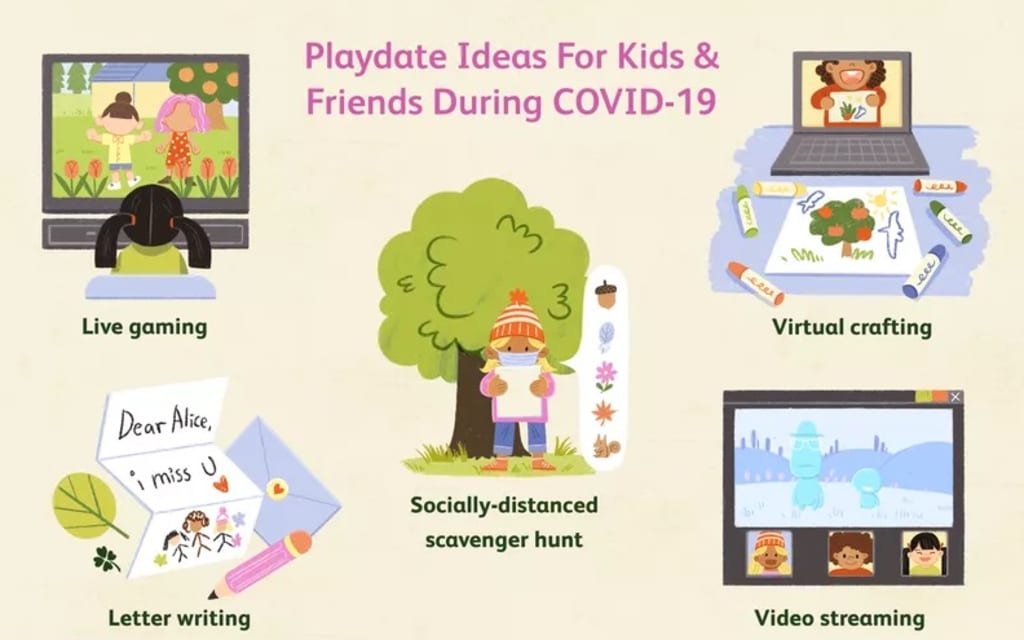How Can You Support Your Children in Making Friends During the COVID-19 Pandemic?
The COVID-19 pandemic has had a wide range of effects on our children

The COVID-19 pandemic has had a wide range of effects on our children, but arguably the most significant is how it has damaged their friendships. Making friends has taken on new meanings for our children as a result of social isolation, mask-wearing, social distancing, and school and childcare closures.
This drastic development has most certainly frightened us as parents. We all want our children to be happy, and we all understand that childhood should be enjoyed with others. Our children's well-being depends on their ability to socialize. We see how our children suffer when they are separated from their peers, and we all want to ensure that their childhoods are as normal, stress-free, and enjoyable as possible.
The good news is that the epidemic won't last indefinitely. Our children will soon be ready to interact properly with their friends as the world starts moving again and we get further away from vaccine availability for children.
Until then, there are a variety of ways we can help our children make new friends, socialize with those they already have, and cope with the many changes brought on by the pandemic.
Friendship's Importance in Children's Development
Nobody can deny the importance of friendships for our children, and we don't need an expert to tell us that mingling with friends is beneficial.
No one knows what it's like to be a kid better than another kid. There is no one better to participate in free, imaginative play with than another youngster. A good friend is the best person to play games with, talk about mutual interests with, and share feelings with.
According to research from the University of Florida, friendships are critical to our children's growth. Youngsters who do not build ties with other children, for example, may have mental health issues later in life.
Friendships instill vital social skills like cooperation, active listening, and problem-solving. Friendships may even assist children in achieving academic success.
Friendships aren't always sunshine and rainbows, though. Children who are bullied, ridiculed, or placed in emotionally or physically dangerous situations as a result of peer interactions suffer. However, these are the exception rather than the rule, and it is critical for our children's development to allow them to experience many types of friendships as freely as possible during their youth.
During the pandemic, making friends is difficult.
Children will have more opportunities to connect with their peers as schools, daycares, and camps reopen. Despite this, some children intend to return to school digitally. Those who do attend in person may find it difficult to socialize in the same way they did before, as masks and social distancing alter the dynamic dramatically.
This means that kids will have to continue to find new methods to socialize—and while youngsters are more adaptable than we may think, these new circumstances haven't been easy.
This is especially true for children who are new to an area and are making friends for the first time, as well as those who already have social anxiety. Children with special needs and very young children may find it particularly difficult to navigate the new ways of connecting with other children.
Nonetheless, there are ways for our children, even the youngest and most frustrated, to connect with their peers and even make new friends. And, thanks to the wonders of contemporary technology, finding socialization opportunities for our children is actually easier than you may think. All it takes is a little creativity and forethought.
COVID Precautions to Be Aware Of.
The "out of the box" methods that parents and children have come up with to socialize securely are perhaps the most surprising and beneficial thing to come out of the pandemic.
Many people had never heard of Zoom (or other video conferencing systems) before March 2020, but they have become experts since then. Parents have also devised novel ways to safely congregate in public.
It's vital to note that unvaccinated people who congregate in person with someone who isn't from their household are at danger of contracting COVID-19. People who have not been vaccinated should continue to wear masks, keep a six-foot distance between them, and wash their hands frequently.
According to the CDC, the safest gatherings during the COVID-19 pandemic are those that take place outside, with members of your household or a small group of fully vaccinated friends and relatives. 4, If unvaccinated people are masked, small outdoor meetings with a mixed group of vaccinated and unvaccinated people are also regarded as safe.
Even when an unvaccinated individual is masked, small, uncrowded interior activities like visiting a store or another person's house are less secure. Crowded places like movie theaters, restaurants, and concerts are the least safe activities for unvaccinated people.
It's also a good idea to keep a check on your local COVID-19 infection rate before gathering, even if infections are declining. In regions where infection rates are high, in-person gatherings are risky.
Making Friendship Ideas
Here are a few ideas to get you started in creating opportunities for your children to socialize and make friends, keeping in mind the safety parameters—virtual gathering is the safest option, and outside with masks or distance is the second safest option. Here are a few ideas to get you started in creating opportunities for your children to socialize and make friends.
Virtual Playdates
Virtual playdates can take some getting used to for your child—and younger children will almost certainly want assistance from a parent—but they can be a lot of fun.
Some kids enjoy chatting with their buddies via video chat. Other children, on the other hand, find it easy to engage in an activity. Set up some paper and crayons for your youngster and their pal to color together. Assist your child in moving the camera around so that they can show off their toys or play hide-and-seek.
In many circumstances, your child and a friend will come up with the best ideas for making this work; their imaginations will likely amaze you.
Video Activity Dates
For some children, video chatting becomes more comfortable and pleasant with a more planned activity—often with parental support. Crafting and cooking are excellent candidates for video conferencing services. This necessitates considerable planning.
You must choose an activity and prepare instructions and supplies for all participants. Older children will probably be able to do the exercise on their own, but younger children will require your support.
Streaming movies in real time
Many video companies, including Netflix, allow you to stream videos with others while simultaneously conversing about what you're seeing.
Zoom also supports screen sharing, which involves one participant logging into a movie streaming service and then using the screen sharing feature to live broadcast the video. Pop some popcorn and snuggle up with a friend to watch a movie.
On a real-time basis, gaming
Video games have a poor reputation. While they can be addictive for children, and some of the content can be disturbing at times, they are an excellent way for children to socialize, and they have been shown to be a lifeline for tweens and teens during the pandemic.
Many games allow for live play, and children can use audio to communicate while playing.
Of course, you must ensure that your children only interact with their peers and not strangers. You should also ensure that the video games' material is appropriate for children.
A socially separated scavenger hunt or other organized activity outside.
During the epidemic, children can connect with their peers by playing outside, which is a low-risk activity. Mask-wearing and social separation, on the other hand, must be observed to keep things secure.
That's why participating in a group activity like a scavenger hunt, an exercise or dancing activity, or any other childhood pleasure is a fantastic option. This allows you to keep an eye on your kids and ensure that they keep their distance and make safe decisions while playing.
Pen Pals: The Good, the Bad, and the Ugly
A more introverted child may believe that writing letters is the best way to express himself. Sending physical mail to pals may be a lot of fun and might feel like a new and exciting experience.
Your youngster can also send homemade care packages or arts and crafts through the mail. Other children will enjoy sending emails to their friends or learning to text (if they haven't done so already).
Having a pen pal is a great method for youngsters wishing to make new acquaintances to dip their toes in and get to know someone new.
Online Classes for Enrichment
Children can take classes that are relevant to their unique interests through online platforms like Outschool. These classes are also excellent places for your child to make new friends because they are likely to meet children who have similar interests and values.
Some platforms provide lessons that aren't necessarily focused on a single subject, but rather on more open-ended socializing opportunities.
Bike Rides and Nature Walks
Going on a nature walk and/or riding bikes with a friend are two other low-risk outdoor activities. These activities can be a lot of fun while also allowing for social isolation. Adult supervision may be required depending on your child's age. In either case, you'll want to double-check that everyone is on board with COVID-19 safety procedures before getting together.
Game Nights with the Family
Don't forget about the rest of the family. It is also crucial for children to maintain relationships with cousins, aunts, uncles, and grandparents. Organized activities, such as game nights, function best in this situation. While playing an online video game or another game, you can screen share with family members.
Even traditional board games like Monopoly and Scrabble now have online versions that can be played in groups.
If Your Child Is Depressed or Feels Alone,
Some youngsters have found it simpler to connect with their pals through these alternate methods than others. Video chatting may not be easy or pleasurable for children who are extremely young, new to a particular place, have special needs, or suffer from social anxiety. Don't force your youngster to do anything he or she does not want to do.
Keep in mind that some kids are quite content to just play with their siblings, parents, or alone. Again, the pandemic isn't going to last forever, and it's great if your youngster is fine without frequent social connections. When it is safe to socialize normally again, they will learn to adjust.
However, if your child is really lonely or showing signs of depression as a result of social isolation, you should consult your child's pediatrician, school counselor, or child therapist immediately. It can also be beneficial to have an open, nonjudgmental talk with your child about their feelings, concerns, and anxieties.
It's normal to be grumpy or behave poorly for a few days. However, if your child is displaying persistent signs of distress or is having difficulty functioning on a day-to-day basis, you should seek professional care for your child's mental health.
The following are some indications of anxiety that should be investigated further:
- Anxieties
- Fear of certain places where there are other people (social anxiety)
- Fear of what will happen in the future or of bad things happening
- Separation anxiety
- Rapid breathing or heart rate
- Difficulty breathing
- Dizziness and
Signs of depression that parents should be aware of include:
- Sadness, hopelessness, irritability
- Withdrawing from socializing within the family or among friends
- loss of interest in activities they used to enjoy.
- Difficulty sleeping
- Extreme changes in eating patterns
- Problem concentrating
- Feelings of worthlessness or guilt
- Self-harming behaviors
- Suicidal ideation
Our's Opinion.
We live in extraordinary times, and we are naturally concerned about our children's capacity to develop and maintain friendships.
Parents should do everything we can to help our children maintain social relationships. However, we must recognize that most youngsters have adapted admirably to their circumstances and have discovered new and gratifying ways to socialize.
So, unless our children show evidence of mental health issues or other difficulties, we can probably breathe a little and trust that they will emerge uninjured from this ordeal, possibly with a renewed respect for their favorite buddies.
About the Creator
MD Tarik Aziz
I am a graduate student of Mental Health Counseling . I strive to combine my mental health knowledge and my love of writing to explore all topics related to the human experience. I am also a dedicated Writter and Freelance blogger.
Enjoyed the story? Support the Creator.
Subscribe for free to receive all their stories in your feed. You could also pledge your support or give them a one-off tip, letting them know you appreciate their work.






Comments
There are no comments for this story
Be the first to respond and start the conversation.